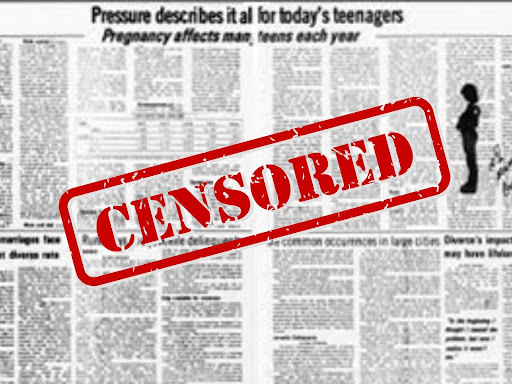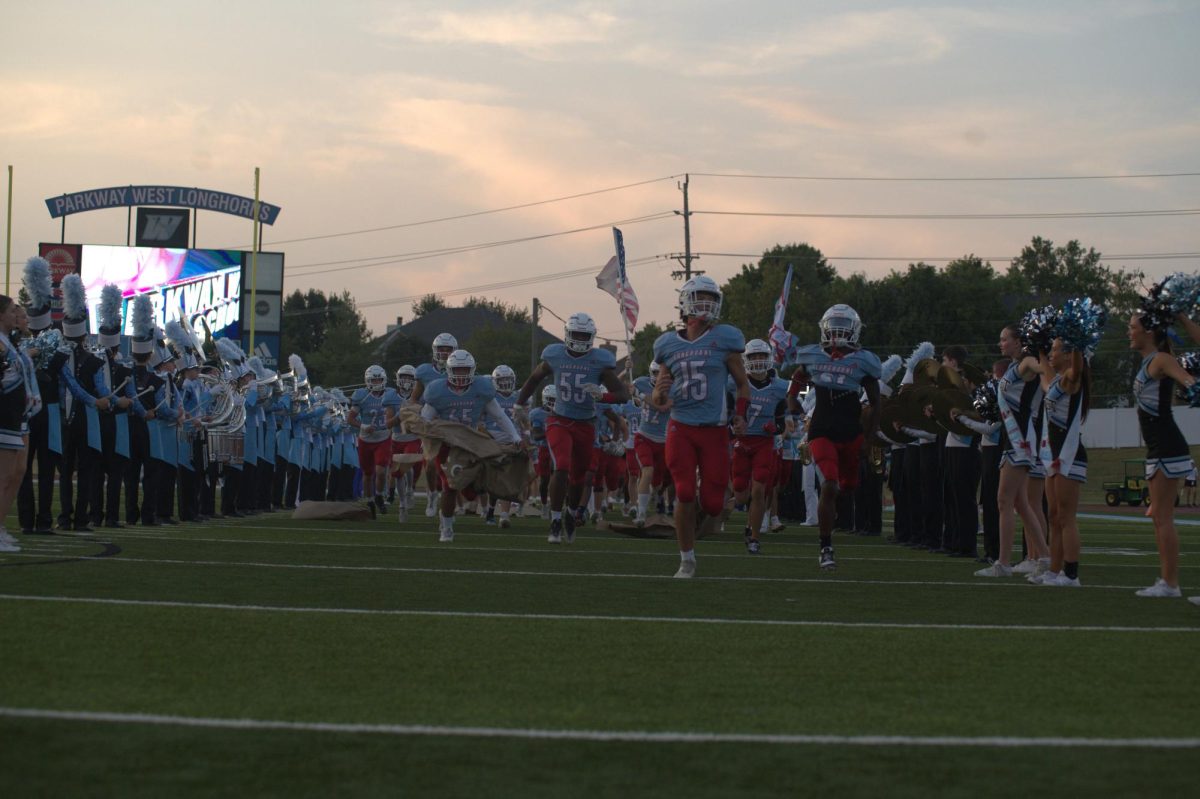
The Pathfinder student newspaper began in 1968—the year Parkway West opened its doors to the students of West County. Throughout our history, the paper has written about plenty of controversial topics. While not every story has been well-received or received at all, we write every one of them with great care and attention to detail. We believe this is our responsibility as journalists and as students of the Parkway School District.
Freedom of the press has not always been aptly applied to student journalism or even American journalism in general. The Alien and Sedition Acts approved just 11 years after the Constitution was adopted were an early limitation to publishing criticism of the government. During World War I, new laws restricted journalists’ freedom during wartime. As recently as 2020, about 125 freedom of the press violations occurred from May 29 to June 1 as police used violent tactics, including arrests, to suppress journalist voices.
Yet, one event that has been uniquely important to us as journalists in St. Louis is the infamous Hazelwood v. Kuhlmeier case. The Supreme Court ruled that student publications are not granted the same freedoms and protections as professional ones. The Court stated that student publications were never intended to be public forums. We disagree.
While the Pathfinder is indeed an educational “supervised learning experience for journalism students,” as Justice Bryon White wrote, we are first and foremost a publication—a place for our staff to express their thoughts, opinions, ideas and to share the stories of our community. We are grateful that our administration has allowed us to do so.
This Feb. 24 marks the fifth annual Student Press Freedom Day, created to increase awareness of the struggles student journalists face and to celebrate their involvement in upholding press freedoms in their communities. This national day was established in 2018 by the Student Press Law Center with different themes surrounding each year. This year’s theme, “Unmute Yourself!,” encourages students to advocate for themselves and combat censorship in the media.
As student reporters, we are not only responsible for educating our community and empowering student voices, but we are also the building blocks that unite our school. Despite the changes and challenges of the year, we have celebrated our peers’ successes, shared underrepresented stories and shed light on those who are struggling. This Student Press Freedom Day, the Pathfinder reflects on what freedom of the press means to us, and why it is so imperative that we are allowed to tell the stories of our community.
We asked our staff why freedom of the press is important to students. Their responses are below.
Makinsey Drake, Staff Writer
“Having the freedom of [the] press is important to me because I love to write about things that interest me and that I know will interest others. Whether it is a controversial topic or an opinion/stance some may not agree with, I enjoy the freedom to pick and choose the topics I investigate and report. Being able to cover a wide variety of subjects and issues keeps things interesting for me while simultaneously making my work more broad, bold and enticing to readers.”
Addie Gleason, Opinions/A&E Editor
“As my peers and I grow older, we become less sheltered from the world around us. Especially with a pandemic bringing light to issues and creating even more divisions within society, there are a lot of problems I’ve noticed within my communities. Freedom of [the] press is very important to me as a student journalist because it has allowed me to speak out about issues that I care about and bring more awareness from a perspective that older generations might not be aware of. Along with speaking about issues that I care about, freedom of [the] press allows me to read articles from other student journalists and learn about the issues in other communities. It’s important to me that our voices are not silenced because the press allows us to interact with one another and have open, respectful conversations about issues that we care about.”
Elizabeth Franklin, Staff Writer
“As a student journalist, I believe that freedom of [the] press is important because I can write what I need to write, no matter the subject, without any repercussions or backlash from the government—they can’t arrest me for anything that I write, journalism-wise unless I knowingly break the law. I believe it’s important because censorship of journalism won’t help us tell the truths that need to be told and I believe that freedom of press holds the government—and others—accountable.”
Brinda Ambal, Conceptual Editor-in-Chief
“[Student press freedom has] given me so much confidence, compelled me to educate myself and offered me a sense of safety in representing the voices of those around me. Seeing the community light up or engage with [the] content we publish and having it lead to meaningful discussion is not always possible under restricted press rights, and I’m grateful that we have great administration who support freedom of the press in schools despite living in a Hazelwood state.”
Chris Reed, CJ1 Writer
“I have to write the stories and cover important events. Sometimes the events aren’t socially acceptable or avoided. If I can’t write about them, nobody will ever learn about them. Not having freedom of [the] press also hinders my creative abilities because I can’t write about what I want to write about.”
Leah Schroeder, Managing Editor-in-Chief
“Having the freedom of [the] press is important to me as a student journalist because I believe that voicing your opinion and the opinions of others is very important. We have seen plenty of controversial issues in our community, especially recently, and I appreciate covering both sides as a student journalist to accurately portray what our community is experiencing. I also think that many people can learn from hearing opinions different from their own, so I am glad that we have the freedom to represent a variety of opinions within our publication.”
Sophia Johnson, Yearbook
“Having the freedom to express opinions and facts can be stated in many ways. Many people claim government propaganda affects much of the news and I think there is some truth in that but by having a voice of my/our own we can share our truths and events. We also decide what to publish and what not to publish. The more people who share their voice the more transparent and inclusive the world and our community can be.”
Elle Rotter, Awards Coordinator
“It is important to get the most accurate information out when we are writing in journalism. If we are being censored, that may not always happen, so that’s why it is a blessing to have freedom of [the] press as high school students. It’s already a risky thing that we do—calling out actions of the school or bringing awareness to controversial topics—so being able to do that without being censored is an amazing freedom to have.”
Anshu Chappidi, CJ1 Writer
“[Freedom of the press] is important to me as a student journalist because it allows us to convey important issues that affect us on a day to day basis and spread knowledge about what students and teachers deal with without having a filter blocking out the truth.”
Ashlyn Gillespie, News and Sports Editor
“If there is something that I decide not enough people are talking about, I need the freedom to dive deep into the subject and show the world. [So,] having that drive to point out the not-so-obvious is contingent on having the freedom to do so.”
Madi Michajliczenko, Staff Writer
“Freedom of the press allows students like us to bring light to important issues within the school. Issues that may be swept under the rug to keep up the school’s reputation. Parkway West has many of these issues that typically are not spoken about. From redistricting schools to burnout in gifted students to problems with parking, students and teachers need to be aware of what is truly happening in the community. Without this freedom, important issues would be ignored and that ignorance would bring harm to those who need to be spoken about.”



![Sitting courtside before a junior varsity girls’ tennis match, senior Tanisi Saha rushes to finish her homework. Saha has found herself doing academic work during her athletic activities since her freshman year. “Being in sports has taught me how to stay organized and on top of my schoolwork. [With] a busy practice and game schedule, I’ve learned to manage my homework and study time better,” Saha said.](https://pwestpathfinder.com/wp-content/uploads/2025/11/DSC_0022-1200x800.jpg)
![Sophomore Maryem Hidic signs up for an academic lab through Infinite Campus, a grading and scheduling software. Some students enjoyed selecting their responsive schedule in a method that was used school-wide last year. “I think it's more inconvenient now, because I can't change [my classes] the day of, if I have a big test coming and I forget about it, I can't change [my class],” sophomore Alisha Singh said.](https://pwestpathfinder.com/wp-content/uploads/2025/10/DSC_0012-1200x801.jpg)
![Senior Dhiya Prasanna examines a bottle of Tylenol. Prasanna has observed data in science labs and in real life. “[I] advise the public not to just look or search for information that supports your argument, but search for information that doesn't support it,” Prasanna said.](https://pwestpathfinder.com/wp-content/uploads/2025/10/DSC_0073-2-1200x800.jpg)
![Junior Fiona Dye lifts weights in Strength and Conditioning. Now that the Trump administration has instituted policies such as AI deregulation, tariffs and university funding freezes, women may have to work twice as hard to get half as far. "[Trump] wants America to be more divided; he wants to inspire hatred in people,” feminist club member and junior Clara Lazarini said.](https://pwestpathfinder.com/wp-content/uploads/2025/05/Flag.png)
![As the Trump administration cracks down on immigration, it scapegoats many immigrants for the United States’ plights, precipitating a possible genocide. Sophomore Annabella Whiteley moved from the United Kingdom when she was eight. “It’s pretty scary because I’m on a visa. When my visa expires next year, I’m not sure what’s going to happen, especially with [immigration] policies up in the air, so it is a concern for my family,” Whiteley said.](https://pwestpathfinder.com/wp-content/uploads/2025/05/DSC_0077-7copy.jpg)
![Shifting global trade, President Donald Trump’s tariffs are raising concerns about economic stability for the U.S. and other countries alike. “[The tariffs are] going to pose a distinct challenge to the U.S. economy and a challenge to the global economy on the whole because it's going to greatly upset who trades with who and where resources and products are going to come from,” social studies teacher Melvin Trotier said.](https://pwestpathfinder.com/wp-content/uploads/2025/05/MDB_3456-1200x800.jpg)



![Some of the most deadly instances of gun violence have occurred in schools, communities and other ‘safe spaces’ for students. These uncontrolled settings give way to the need for gun regulation, including background and mental health checks. “Gun control comes about with more laws, but there are a lot of guns out there that people could obtain illegally. What is a solution that would get the illegal guns off the street? We have yet to find [one],” social studies teacher Nancy Sachtlaben said.](https://pwestpathfinder.com/wp-content/uploads/2025/01/DSC_5122-1200x800.jpg)

![Sophomore Shree Sikkal Kumar serves the ball across the court in a match against Lindbergh. Sikkal Kumar has been a varsity member of the varsity girls’ tennis team for two years, helping her earn the number two rank in Class 2 District 2.“When matches are close, it’s easy to get nervous, but I [ground] myself by[staying] confident and ready to play,” Sikkal Kumar said.](https://pwestpathfinder.com/wp-content/uploads/2025/11/DSC2801-1200x798.jpg)
![Dressed up as the varsity girls’ tennis coach Katelyn Arenos, senior Kate Johnson and junior Mireya David hand out candy at West High’s annual trunk or treat event. This year, the trunk or treat was moved inside as a result of adverse weather. “As a senior, I care less about Halloween now. Teachers will bring their kids and families [to West’s Trunk or Treat], but there were fewer [this year] because they just thought it was canceled [due to the] rain. [With] Halloween, I think you care less the older you get,” Johnson said.](https://pwestpathfinder.com/wp-content/uploads/2025/10/DSC00892-1-1200x800.jpg)
![Focused on providing exceptional service, sophomore Darsh Mahapatra carefully cleans the door of a customer’s car. Mahapatra has always believed his customers deserve nothing less than the best. “[If] they’re trusting us with their car and our service, then I am convinced that they deserve our 100 percent effort and beyond,” Mahapatra said.](https://pwestpathfinder.com/wp-content/uploads/2025/10/DSC_0018-1200x800.jpg)
![Sophomore Aleix Pi de Cabanyes Navarro (left) finishes up a soccer game while junior Ava Muench (right) warms up for cross country practice. The two came to Parkway West High School as exchange students for the 2025-2026 school year. “The goal for the [exchange] program is to provide opportunities for both Parkway students and our international exchange students to learn about other cultures, build connections and become confident, capable, curious and caring — Parkway’s Four C’s — in the process,” Exchange Program Lead Lauren Farrelly said.](https://pwestpathfinder.com/wp-content/uploads/2025/10/Feature-Photo-1200x800.png)
![Leaning on the podium, superintendent Melissa Schneider speaks to Parkway journalism students during a press conference. Schneider joined Parkway in July after working in the Thompson School District in Colorado. “My plan [to bond with students] is to get things on my calendar as much as possible. For example, being in [classes] is very special to me. I am trying to be opportunistic [meeting] kids [and] being in [the school] buildings. I have all the sports schedules and the fine arts schedules on my calendar, so that when I'm available, I can get to them,” Schneider said.](https://pwestpathfinder.com/wp-content/uploads/2025/09/IMG_5425-1200x943.jpeg)
![Gazing across the stage, sophomore Alexis Monteleone performs in the school theater. The Monteleone family’s band “Monte and the Machine” has been releasing music since 2012, but Alexis started her own solo career in 2024 with the release of her first single, Crying Skies. “My whole family is very musical, [and I especially] love writing [songs with them],” Monteleone said.](https://pwestpathfinder.com/wp-content/uploads/2025/09/DSC7463-1200x798.jpg)

![Leaping through the air, senior Tyler Watts celebrates his first goal of the season, which put the Longhorns up 1-0 against the Lafayette Lancers. Watts decided to play soccer for West for his last year of high school and secured a spot on the varsity roster. “[Playing soccer for West] is something I had always dreamed of, but hadn’t really had a good opportunity to do until now. It’s [really] fun being out [on the field], and I’m glad I decided to join the team. It’s just all about having fun with the boys and enjoying what time we have left together,” Watts said.](https://pwestpathfinder.com/wp-content/uploads/2025/09/DSC_1951-1200x855.jpg)



Nancy Ramig • Feb 24, 2022 at 5:46 pm
Outstanding article. This segment was very informative on a topic that many people probably don’t realize has such a history.